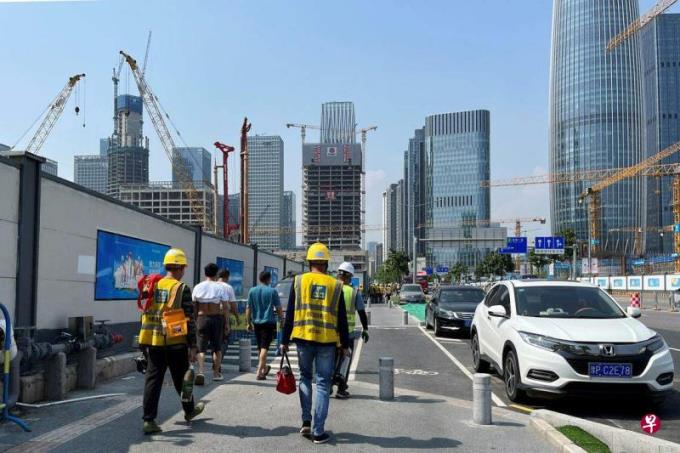
China's official has continued to release loose signals in the property market for days. The industry is optimistic about first -tier cities for loosening the property market this month, and mortgage and purchase restriction policies are the main entry.However, in order to avoid short -term price fluctuations, local governments are expected to not overwhelm "fierce medicines" at one time, but they will decide whether to increase according to the market response.
As the Chinese property market weakened again after a brief rebound at the beginning of the year, the Politburo Conference held at the end of July did not mention "housing and not frying", but instead required "adjusting and optimizing real estate policies in a timely manner."Ni Hong, Minister of Housing and Urban -Rural Development, subsequently proposed policy measures such as reducing the down payment rate and loan interest rate of the first house, loan interest rates, improving the tax replacement and exemption of housing housing, and the personal housing loan "do not need to recognize loans".Immediately after, the four first -tier cities in Beijing, Shanghai, Guangzhou, and Shenzhen concentrated their states that they would implement the work.
The People's Bank of China and the State Foreign Exchange Bureau on Tuesday (August 1) requires the implementation of differentiated housing credit policies due to urban policies to continue to guide personal housing loan interest rates and down payment ratios.The Ministry of Public Security announced on Thursday (August 3) that it has comprehensively relaxed the settlement conditions for large cities with a resident population of 3 million to 5 million in urban areas, and improved the policy of settling in large -scale cities with over 5 million people.
Related statements are densely introduced, which continues to improve the market's expectations of the market management and control of first -tier cities.Zhang Xiaoduan, deputy dean of the Dede Liang Xing Research Institute, accepted the United Morning Post and pointed out that the central government pointed out the direction of adjustment for the property market policy to help accelerate the pace of policy formulation and improve flexibility in various places.Among them, mortgage and purchase restriction policies have the greatest impact on the market. It is expected that localities will be adjusted according to local conditions, and may even be refined into the "one district and one strategy".
Statistics of the middle finger research institute show that there have been more than 40 cities in China to adjust the lower limit of the first set of mortgages to less than 4%this year, but the mortgage interest rate of first -tier cities is still high.The interest rates of Beijing's first and second sets of mortgages were 4.75%and 5.25%, respectively, and Shanghai was 4.55%and 5.25%.
The research report on first -tier cities released by the Shanghai Yizhou Real Estate Research Institute this week pointed out that if first -tier cities can implement "housing recognition or not," no matter whether there is a mortgage or not, as long as there is no real estate in the current name, it will beYou can enjoy the down payment ratio and interest rate discount of buying the first house). The down payment ratio of the housing changing population can be reduced from the average of 73%to 33%, and the interest rate can also be reduced from an average of 5.03%to 4.5%.
Yan Yuejin, the director of research, believes that the strict purchasing policy of first -tier cities has partially incorrectly injured the reason for the reasonable purchase demand and pushes the cost of association.For example, the foreign population has the requirements for paying five years of social security in first -tier cities.The purchase restriction policy has increased by about 40%of the living cost. If the policy is loose, it can produce a significant burden reduction effect.
It is reported that this week said that Shanghai will not relax the "house recognition and recognize loans" for the time being, but will let go of the "five new cities" around the urban area.Five years of social security married people can buy a house.
Although Beishangguang and Shenzhen have stated that they will implement the Ministry of Housing and Construction Policy, local governments are still undergoing soldiers.Zhang Xiaoduan analyzed that first -tier cities, as the vane of the property market, are still relatively cautious in large actions. "The starting point is to stabilize the market and not make the heat too high, because 'houses do not speculate' are still long -term directions."
Wang Jun, chief economist of Huatai Assets, pointed out that in April this year, Beijing announced that it was in the Fangshan District to pilot multi -children's family and vocational duty to livelier the balanced household purchase support policy, but it still "only smells the stairs.""There are too many factors that need to be weighed in first -tier cities, especially in Beijing and Shanghai. In contrast, Guangzhou may introduce policies earlier, but it will not be one step in place./P>
Zhang Xiaoduan also judged that the head city will not pass the fierce medicine under the property market at one time, but gradually introduce policies. If the effect is not obvious, it will continue to follow up.Therefore, it is expected that the overall market is difficult to rebound quickly in the short term.




